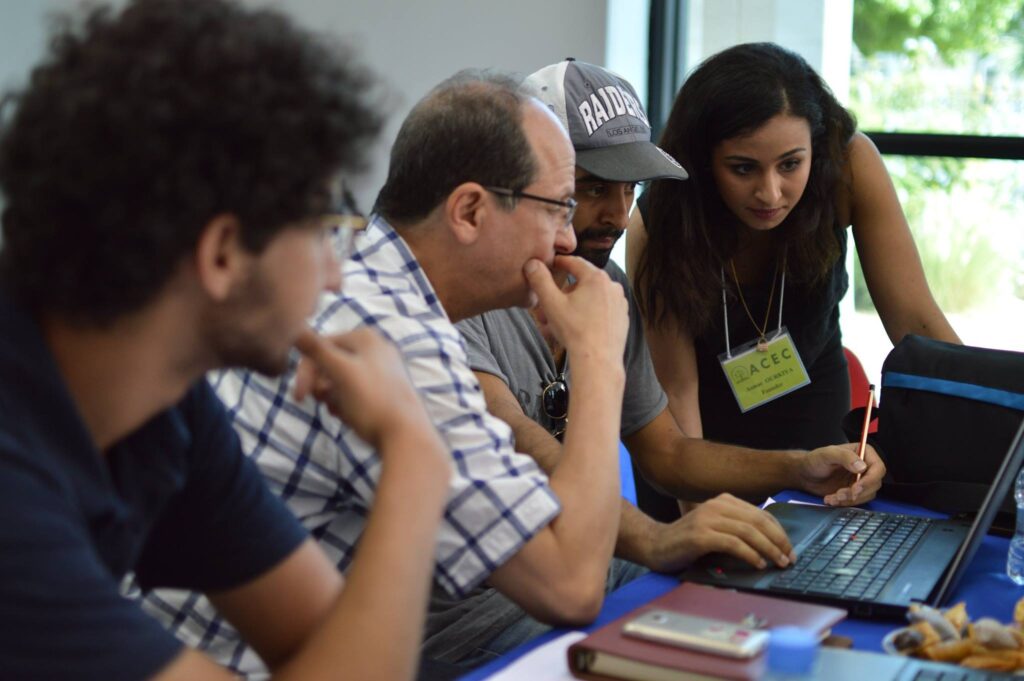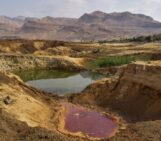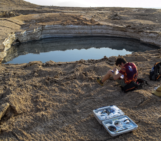
Have you ever thought “what if I could take my geochemistry research further?” Imagine founding a company, patenting your invention, or collaborating with peers to transform your work into a tangible product or service that benefits society. If you did, then this blog post might change the course of your career!
Geochemistry is a powerful tool for understanding Earth’s processes and resources, with vast potential for real-world applications. Yet, geochemists sometimes find themselves locked in the academic ivory tower, with little to no entrepreneurial skills needed to step into the marketplace. Let’s face it—a lot of universities bear some responsibility here. While industry research tends to emphasize practicality and focuses on translating ideas into commercially viable solutions, academic settings often take a curiosity-driven approach with a focus on fundamental research and the pursuit of deeper understanding.
So what can you do if you have an entrepreneurial mindset and you do not see yourself bound solely by academia?
Identifying industry challenges: The first step towards innovation
Think of innovative entrepreneurship this way: You must identify a problem, then work towards presenting a solution (or a better one if solutions already exist). A key strategy for translating geochemical research into practical applications is identifying pressing industry challenges. Consider for instance mining, energy, or environmental remediation: These usually face significant technical and operational hurdles that geochemical expertise can address. For example:
- Mining: Challenges include optimizing mineral extraction, reducing environmental risks, and finding new mineral deposits.
- Energy: Opportunities exist in reservoir characterization, subsurface fluid analysis, and enhancing exploration efficiency.
- Environmental remediation: Addressing pollution, soil contamination, and water treatment requires innovative geochemical solutions.
It is important then to develop a deep understanding of the specific needs and pain-points of these industries, as this will enable you to develop actionable solutions. Think of it as “research prospecting”—the better you know your terrain, the more likely you’ll strike valuable insights.
Collaboration with industry partners
Strong relationships with industry professionals are essential for translating academic research into real-world applications. These partnerships can provide access to valuable data, resources, and funding, which significantly accelerate the development and deployment of your upcoming geochemical innovation. Here are practical steps to establish and nurture these collaborations:
- Networking: Attend industry-focused events and engage in professional organizations to connect with potential collaborators. In 2016, I received my first small grant to support a community solution I had developed as the inaugural program for ACEC (Association of Cultural Ecology and Communication), the NGO I had just founded in Morocco. That same year, at a friend’s book launch event, I was mingling with various guests, unaware that one of them happened to be a city council member. Over tea, we struck up a conversation, during which I shared my idea of organizing an environmental degradation competition and culminate it into an exhibition to spotlight environmental issues like animal abuse and waste management in my city. To my surprise, he was so inspired by the concept that he offered to fund the venue, catering, and prizes for the competition winners. I know it does not seem like much, but younger me was over the moon to have secured funding for my first NGO event!

Picture taken in Oujda, Morocco of myself, the founder of ACEC, with the jury that selected the top three winners of the photography competition.
- Industry research grants: Funding exists beyond research institutions. You might be familiar with some industry organizations that are geochemistry-focused or adjacent, but have you ever checked their website to see if they have any open calls for funding? Do your research, find out what companies in your area of expertise are looking for, or even better, knock on their door and offer what you have as an indispensable value: Your proposal for innovation and solutions (while keeping in mind that you must protect your intellectual property, so do not share your work in advance unless you have an agreement that was signed beforehand).
- Internships: Even as an undergraduate student, I have always had the tendency to infiltrate industry while maintaining a high academic standard as a scholar. The flexibility that universities offer when it comes to schedules and deadlines has enabled me since I was 18 to apply for several internships (mostly short-term) so I could feed my enormous curiosity for the unknown! So now, I can confidently say that interning is an excellent first step (yes, regardless of your age or how far you are in your academic career as a researcher) towards creating a presence in industry for yourself. Short-term placements can help you gain practical experience and identify gaps where your expertise can make a difference.
Remember, the best collaborations are like isotopes—balanced, stable, and full of potential!
Leveraging geochemistry expertise across sectors
As a Geochemist, you possess a unique and highly versatile skillset that can be applied across a wide range of sectors. Armed with a deep understanding of Earth’s building blocks and the chemical processes shaping our world, your expertise digs far beyond the surface as it is the source of solutions to some of the most pressing challenges of our time.
In environmental management, you might act as a “pollution detective”: You can do this by exposing contaminants in soil and water or designing sustainable waste management strategies that leave a lighter footprint on the planet.
In the energy sector, your skills can help fuel innovation—literally—by driving responsible resource extraction, pinpointing new mineral reserves, or advancing green energy technologies through critical material discovery.
The fight against the ongoing and accelerated warming of our planet offers another stage for your talents. Through isotopic analysis and geochemical modelling, you are already contributing to the science behind carbon sequestration and informing global policies aimed at cooling Earth down.
Agriculture is another fertile ground for your expertise. Your abilities enable you to analyse soil constituents on the molecular level and detect nutrient imbalances that could negatively impact plant growth, hence your eligibility to provide recommendations to benefit from fertilizers and amendments, thereby minimizing waste and preventing environmental leaching. Also, don’t forget that geochemical data related to water quality and water availability are of paramount importance for the development of sustainable irrigation practices, so that agriculture can still “make it” under the new climate.
Even the final frontier isn’t off-limits for geochemists: Whether analysing Martian rocks or lunar regolith, your expertise propels humanity’s aim to understand other worlds. Closer to home, industries like construction, pharmaceuticals, and forensic science rely on your work for everything: from ensuring material integrity to solving crimes.
At its core, geochemistry is the art of reading Earth’s story—and rewriting it where needed. Whether you’re prospecting for the future, cleaning up the past, or innovating in the present, your work proves that the value of a geochemist is truly elemental.
Exploring start-ups, spinouts, and patents
If you are aspiring to turn your research into tangible products or services, creating a start-up or spinout company is an exciting pathway. The journey from academic research to entrepreneurship involves several critical steps:
- Identifying commercial potential: Evaluate your research for innovative ideas that address market needs. Seek advice from technology transfer offices or innovation hubs at your institution.
- Protecting Intellectual Property (IP): Before sharing your ideas, consult with IP specialists at your institution to secure patents or trademarks. Protecting your innovations ensures that you maintain control over their development, commercialization, and monetization.
- Building a business plan: Develop a clear roadmap that outlines your value proposition, target market, revenue model, and growth strategy. Speak to professors in your department who have previous experiences with innovation and entrepreneurship, and do not shy away from asking as many questions as you have. Also, keep an eye on the knowledge transfer office at your university as some of these offices provide free training courses and in-person workshops with experts to help you start your entrepreneurial journey.
- Securing funding: Money money money! Explore funding sources such as grants, venture capital, and angel investors. The more funding your receive, the more credibility you build (and do not underestimate any amount no matter how small or insignificant you might think it is). Many governments and institutions offer programs specifically designed to support science-based start-ups.
- Bring your start-up to life: Your key help here is entrepreneurship incubators at your university. No one is born an entrepreneur, and starting with a spin-off is an excellent and safe way to bring your baby project to life! Use the services and resources such incubators offer, and educate yourself on local laws and tax regulations before your finalise the paper work of your company.
- Scaling up: Once your start-up is established, focus on scaling your operations. This might involve expanding your team, forming strategic partnerships, and diversifying your product or service offerings.
Now, what if you made it all the way here reading this blog post, but you’ve already searched for either an incubator or a technology transfer office at your institution, and you are not happy with the results? You have other options! For instance, Germany’s SPRIND introduced a venture science doctorate (VSD) program which aims to fund 150 spin-out-focused PhDs by 2029, designed to turn researchers into entrepreneurs.
Learning from success stories
Representation is important! This is why I selected a couple of examples below, to show you that if someone else can do it, so can you!
- Carbfix: Originating from research in Iceland, Carbfix has developed a ground-breaking method to capture and store CO₂ by turning it into rock. This innovative solution addresses climate change by utilizing geochemical processes to permanently sequester carbon emissions underground.
- WaterFX: WFX is a non-profit platform created by an experienced team of water and finance professionals to develop and fund community-based water projects. It applies geochemical expertise to solar-powered water desalination and treatment, and tackles water scarcity and environmental contamination with sustainable, cost-effective technology.
The role of patents in geochemical innovation
Patenting your innovations is a vital step in bridging the gap between research and commercialization. Patents provide legal protection and ensure that your discoveries are not replicated or exploited without your consent. I know you might think: But where do I even begin? My advice to you, if you are working on patentable project, is to consult with your Principal Investigator (if you have one) and get in touch immediately with your Technology Transfer offices (also know as Knowledge Transfer or Research and Innovation offices). These offices exist to help you with the commercialisation of your research in every step, from establishing your IDF (Invention Disclosure Form) all the way to securing your patent and even licensing it! (Yes, I worked for a year as the IP operations manager at Trinity College Dublin’s knowledge transfer office, hence my knowledge of the A to Z processes within universities).
Final thoughts
As a Geochemist, you have the power to drive innovation and create significant societal impact. By developing an entrepreneurial mindset, collaborating with industry partners, and exploring pathways such as start-ups, patents, and licenses, you can bridge the gap between academic research and real-world applications.
Universities, too, need to step up their game, because offering entrepreneurship training alongside research programs could be the secret ingredient that turns academic brilliance into practical gold. After all, scientists are more than lab-bound researchers; you are potential pioneers of transformative innovation.





